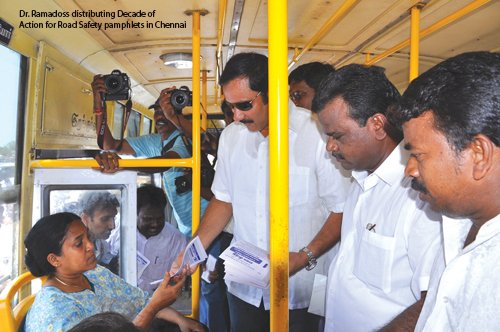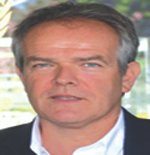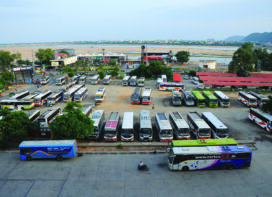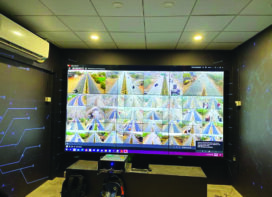 Since the launch of the Decade, a number of countries have developed national plans in line with this Global Plan, like Austria, Canada, Egypt, Israel, Mexico, Panama, the Philippines and Slovakia, among others. New legislation has been issued, for example, in Chile on seat-belts for people on inter-city buses; in China on criminalising drinking and driving and increasing penalties for offenders; and in New Zealand on lowering the drinking and driving limit for drivers under 20 years of age. Governments have also increased enforcement of existing legislation, such as Brazil on drinking and driving, Turkey on using seat-belts, and Vietnam on wearing helmets. India joins a number of nations including Ghana, Mozambique and Pakistan which continue to make strides in improving their trauma care systems.
Since the launch of the Decade, a number of countries have developed national plans in line with this Global Plan, like Austria, Canada, Egypt, Israel, Mexico, Panama, the Philippines and Slovakia, among others. New legislation has been issued, for example, in Chile on seat-belts for people on inter-city buses; in China on criminalising drinking and driving and increasing penalties for offenders; and in New Zealand on lowering the drinking and driving limit for drivers under 20 years of age. Governments have also increased enforcement of existing legislation, such as Brazil on drinking and driving, Turkey on using seat-belts, and Vietnam on wearing helmets. India joins a number of nations including Ghana, Mozambique and Pakistan which continue to make strides in improving their trauma care systems.
Such national efforts have been complemented by increased action at the global level. In April 2012, the 66th session of the UNGA adopted resolution A/66/L.43 improving global road safety. It welcomed official national and local launches of the Decade; commended Member States that have nominated national Decade focal points and developed national Decade plans; encouraged action on all pillars of the Global Plan; and called for government leadership in preparing advocacy events such as the annual World Day of Remembrance for Road Traffic Victims and the Second United Nations Global Road Safety Week scheduled for 6-12 May, 2013.
 The new UNGA resolution also called for adequate and additional funding for activities related to the Decade, encouraging all relevant stakeholders to explore new and innovative funding mechanisms to support implementation of the Global Plan, particularly in developing countries. In this regard, two funds have been recently established: the WHO and FIA Foundation?s ?Road Safety Fund? and the Bloomberg Philanthropies? ?Road Safety Grants Programme?, both of which have begun to distribute funding to governments and nongovernmental organisations (NGOs) which propose action to further national road safety efforts. WHO has also supported establishment of a Global Alliance of NGOs for Road Safety which seeks to strengthen the advocacy efforts of NGOs towards governments.
The new UNGA resolution also called for adequate and additional funding for activities related to the Decade, encouraging all relevant stakeholders to explore new and innovative funding mechanisms to support implementation of the Global Plan, particularly in developing countries. In this regard, two funds have been recently established: the WHO and FIA Foundation?s ?Road Safety Fund? and the Bloomberg Philanthropies? ?Road Safety Grants Programme?, both of which have begun to distribute funding to governments and nongovernmental organisations (NGOs) which propose action to further national road safety efforts. WHO has also supported establishment of a Global Alliance of NGOs for Road Safety which seeks to strengthen the advocacy efforts of NGOs towards governments.
Regarding the safety of vehicles and roads, there have also been achievements in these areas. The Global New Car Assessment Programme (NCAP) was established in the context of the Decade as a means of encouraging the worldwide availability of independent consumer information about the safety of vehicles. It promotes and conducts independent research and testing on the safety and environmental characteristics of motor vehicles, compares their performance, and disseminates results to the public. What Global NCAP does for vehicles, the International Road Assessment Programme (iRAP) does for roads. Active in around 70 countries, the charity inspects high-risk roads, grants star ratings, develops safer roads investment plans, and tracks road safety performance so that funding agencies can assess the benefits of their investments. In the previous year, iRAP has supported assessments in countries such as Bangladesh, Belize, China and Uganda.
The 2009 WHO Global status report on road safety highlights that in 2008 only 15% of the countries had comprehensive laws ? meaning laws which are internationally recognised as best practices ? addressing the key behavioural risks noted above. One of the Decade?s stated targets is to raise that figure to 50% of the countries by 2020. Evidence from a number of high-income countries suggests that measures to strengthen and enforce legislation around the use of helmets, seat-belts and child restraints, and the prevention of drinking and driving and speeding, are not only effective in saving lives, but are also cost-effective.
 While attaining this 50% target would be an enormous achievement, having such optimal legislation in place is only a first step. This legislation needs to be accompanied by strict enforcement, brought to the attention of the public through mass media campaigns, and backed by statements of strong political will from the highest levels of government. The result of these actions is what leads to the creation of a culture of safety and ultimately, saves lives.
While attaining this 50% target would be an enormous achievement, having such optimal legislation in place is only a first step. This legislation needs to be accompanied by strict enforcement, brought to the attention of the public through mass media campaigns, and backed by statements of strong political will from the highest levels of government. The result of these actions is what leads to the creation of a culture of safety and ultimately, saves lives.
Improving people?s behaviour and the quality of vehicles and roads is important. Another vital focus, however, should be the enhancement of urban planning and public transport systems. For too long, planning has focused largely on facilitating transport through the use of private motor vehicles, thereby reducing opportunities for safe walking or cycling or using safe public means of transport. For transportation systems to be healthy, there is a need to increase the options for safe walking and cycling as a priority. This will improve road safety as well as contribute to reductions in diseases such as heart disease, diabetes, cancer, and depression. As travel by car is reduced, there is also decline in air and noise pollution which again improves the health of city dwellers.
In WHO?s work with road traffic victims these past few years, it is clear that for the families and communities which have been affected by a road traffic crash, the pain and suffering is unimaginable. The anguish lasts a lifetime. Like the war-affected, many survivors mark their lives between the period before the crash and the period since the crash.
If all countries implement the Global Plan, five million lives could be saved and 50 million injuries averted across the ten-year period. We must take the opportunity of this Decade to honour those who have lost their lives on the world?s roads by acting to spare the lives of others.
 (Dr Krug has overseen the development of several world reports and guidelines, major intergovernmental resolutions, country projects, and preparations for global events such as World Health Day 2004 and the launch of the Decade of Action for Road Safety 2011-2020. He also chairs the International Organising Committee for World Conferences on Injury Prevention and Safety Promotion and the United Nations Road Safety Collaboration and is member of the Editorial Board of several scientific journals).
(Dr Krug has overseen the development of several world reports and guidelines, major intergovernmental resolutions, country projects, and preparations for global events such as World Health Day 2004 and the launch of the Decade of Action for Road Safety 2011-2020. He also chairs the International Organising Committee for World Conferences on Injury Prevention and Safety Promotion and the United Nations Road Safety Collaboration and is member of the Editorial Board of several scientific journals).
 TrafficInfraTech Magazine Linking People Places & Progress
TrafficInfraTech Magazine Linking People Places & Progress


